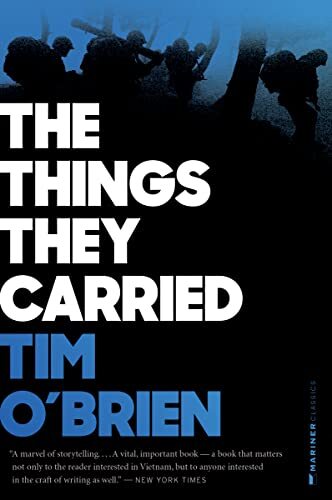
A beautifully written, moving, dark semi-memoir of the Vietnam War that intentionally blurs the line between fiction and reality. The book covers some fascinating themes:
-
The draft: lots of interesting thoughts about the social pressure to join the army and the idea that choosing to go to war can be the cowardly decision.
-
Truth: the book is semi-auto-biographical, but O’Brien also clearly states that the names are changed, the stories are changed, and that this is more fiction than not. And yet, sometimes, fiction can be the best way to get at the truth; that a made up story can be the most honest and real thing there is.
-
War stories: following on the previous theme, there are many stories told from the perspective of soldiers spinning yarn to pass the time. Just as O’Brien does in this book, soldiers at war make up stories all the time too, and these too have a tendency to blur the line between myth and reality.
-
Bravery: what it really means to be brave and the hero we want to be in our mind vs who we really are when bullets start flying.
-
The cost of killing: one of the “did this really happen?” stories is of O’Brien’s first kill. Most fiction stories, especially war stories, completely ignore toll taking a life would have on someone. This book dives right into it and looks at it from a variety of perspectives: the US soldier who pulls the trigger (or, in this case, throws the grenade), the other US soldiers who he protected by doing this, the Vietnamese soldier who gets killed, the Vietnamese soldier’s family, the green recruit, the veteran, and so on.
-
The cost of death: no war story could be complete without looking at the toll of seeing fellow soldiers get killed all around you. Again, this book does a great job of looking at it from many perspectives: the soldier who gets killed, the surrounding soldiers, his best friend in the unit, the other soldiers around him, his family, and so on. Every soldier, especially the officers, feels responsible for the men around them, and reading about the weight of that responsibility, and the crushing despair when someone gets killed, was especially moving.
-
Life after war: what happens to the soldiers who are lucky enough to survive and go home. The impact of PTSD, depression, struggling to fit back into normal life, and so on.
It’s not a happy read, but well worth reading nonetheless.
Quotes
I saved a few of my favorite quotes from the book:
I was a coward. I went to the war.
Men killed, and died, because they were embarrassed not to. It was what had brought them to the war in the first place, nothing positive, no dreams of glory or honor, just to avoid the blush of dishonor. They died so as not to die of embarrassment.
That’s what fiction is for. It’s for getting at the truth when the truth isn’t sufficient for the truth.
A thing may happen and be a total lie; another thing may not happen and be truer than the truth.
Fiction is the lie that helps us understand the truth.
A true war story is never moral. It does not instruct, nor encourage virtue, nor suggest models of proper human behavior, nor restrain men from doing the things men have always done. If a story seems moral, do not believe it. If at the end of a war story you feel uplifted, or if you feel that some small bit of rectitude has been salvaged from the larger waste, then you have been made the victim of a very old and terrible lie. There is no rectitude whatsoever. There is no virtue. As a first rule of thumb, therefore, you can tell a true war story by its absolute and uncompromising allegiance to obscenity and evil.
In any war story, but especially a true one, it’s difficult to separate what happened from what seemed to happen. What seems to happen becomes its own happening and has to be told that way. The angles of vision are skewed. When a booby trap explodes, you close your eyes and duck and float outside yourself. The pictures get jumbled, you tend to miss a lot. And then afterward, when you go to tell about it, there is always that surreal seemingness, which makes the story seem untrue, but which in fact represents the hard and exact truth as it seemed.
And in the end, of course, a true war story is never about war. It’s about sunlight. It’s about the special way that dawn spreads out on a river when you know you must cross the river and march into the mountains and do things you are afraid to do. It’s about love and memory. It’s about sorrow. It’s about sisters who never write back and people who never listen.
For Rat Kiley, I think, facts were formed by sensation, not the other way around, and when you listened to one of his stories, you’d find yourself performing rapid calculations in your head, subtracting superlatives, figuring the square root of an absolute and then multiplying by maybe.
You’re never more alive than when you’re almost dead.
Well, right now I’m not dead. But when I am, it’s like…I don’t know, I guess it’s like being inside a book that nobody’s reading. […] An old one. It’s up on a library shelf, so you’re safe and everything, but the book hasn’t been checked out for a long, long time. All you can do is wait. Just hope somebody’ll pick it up and start reading.
